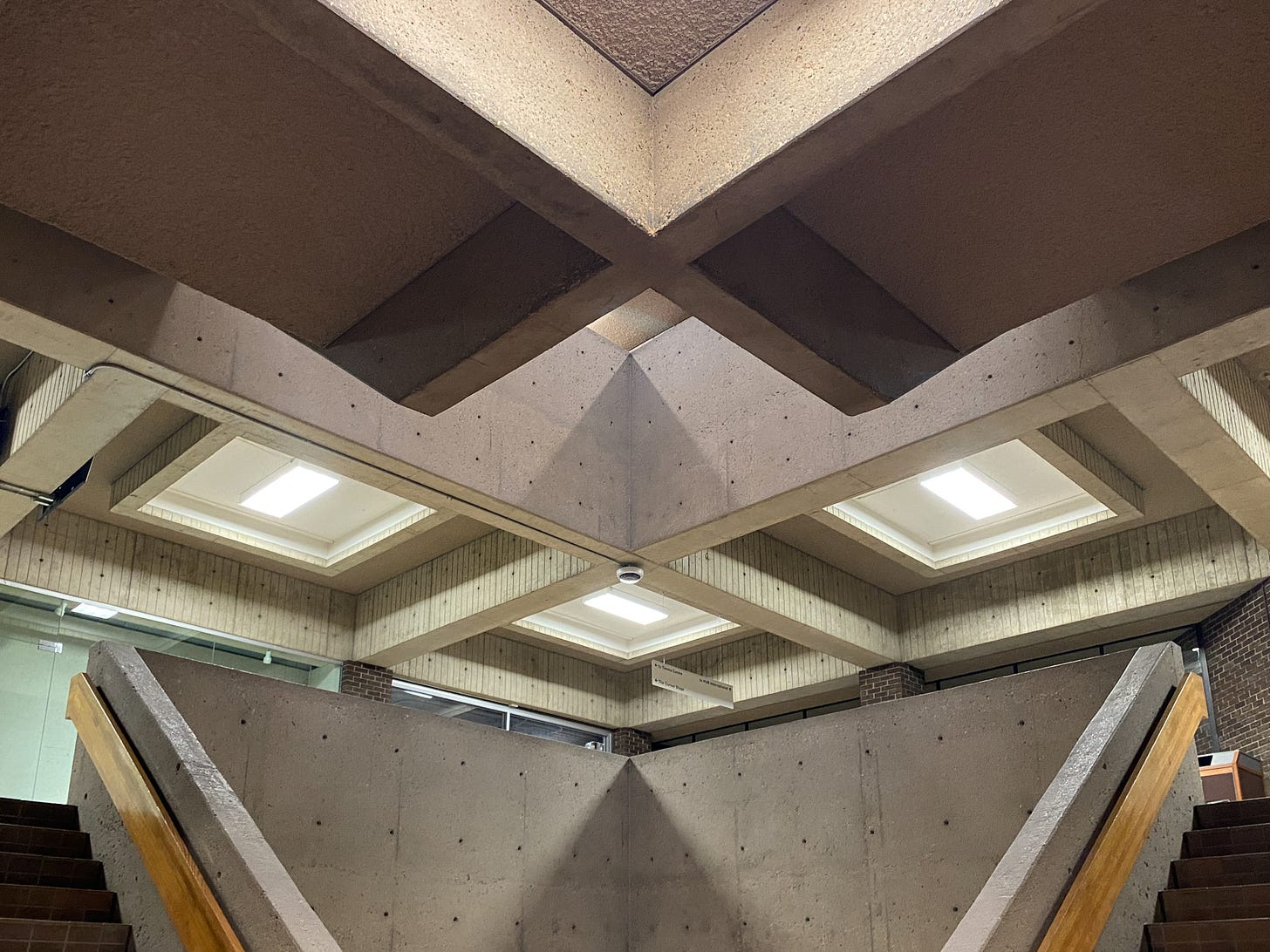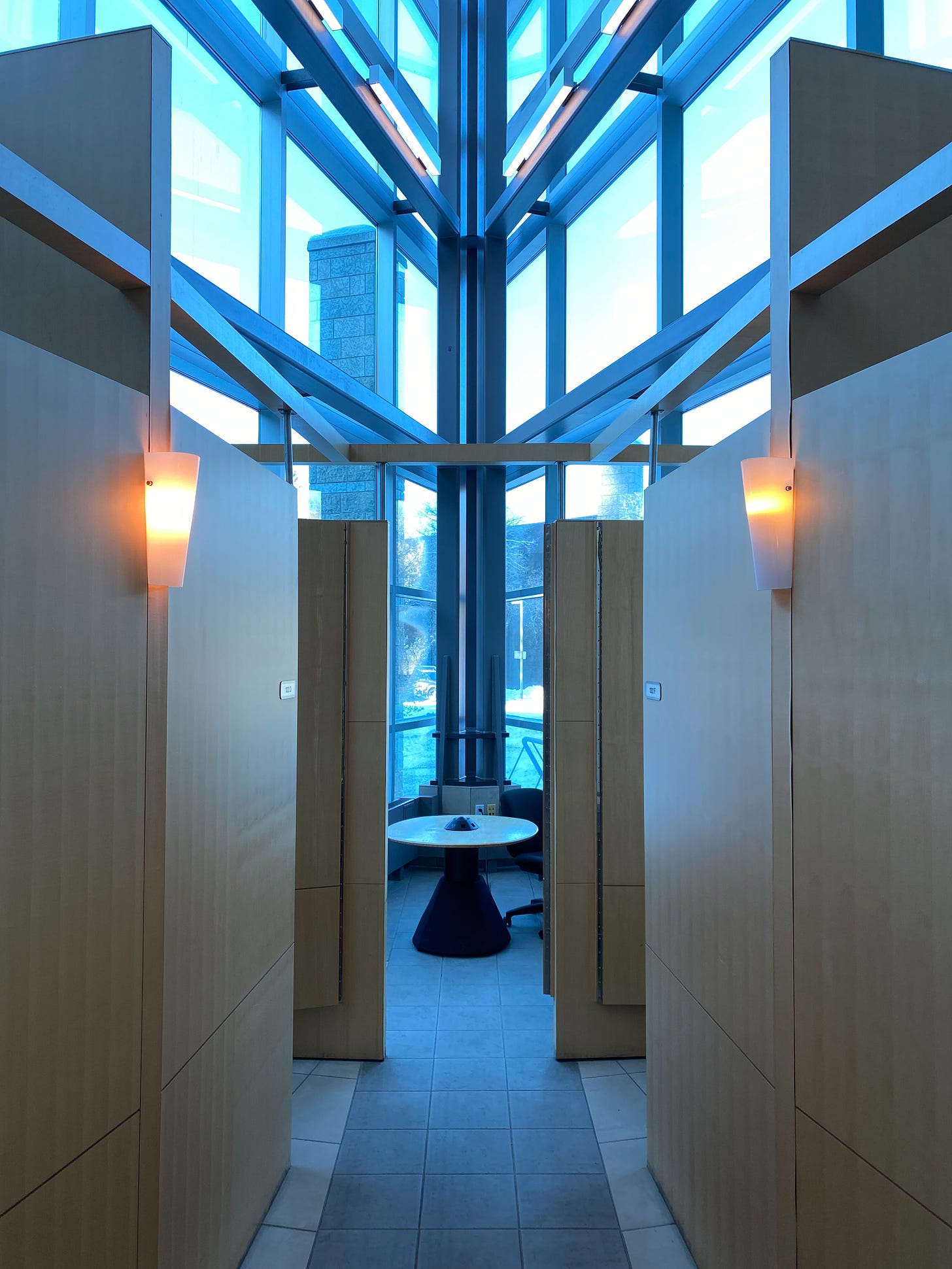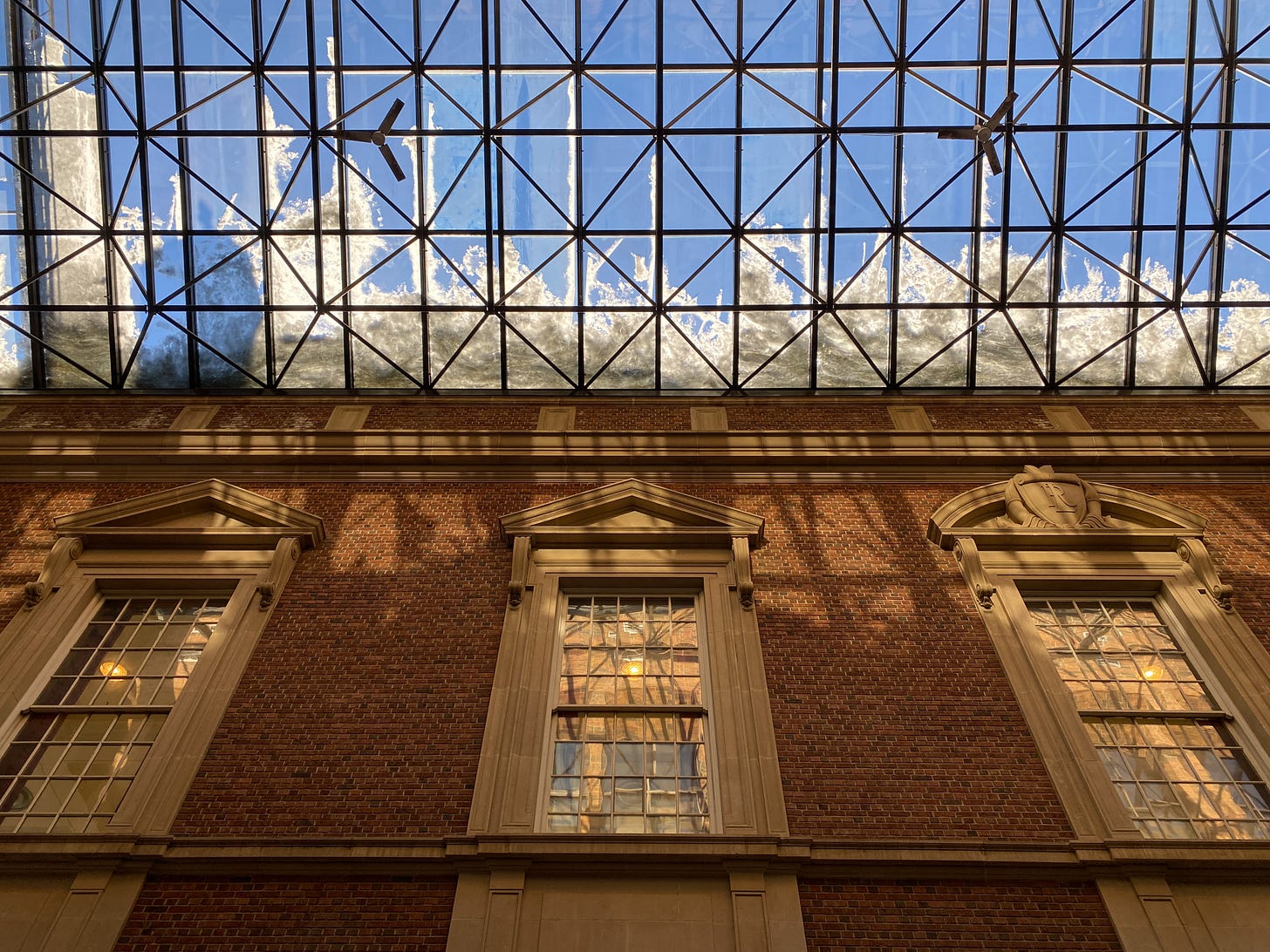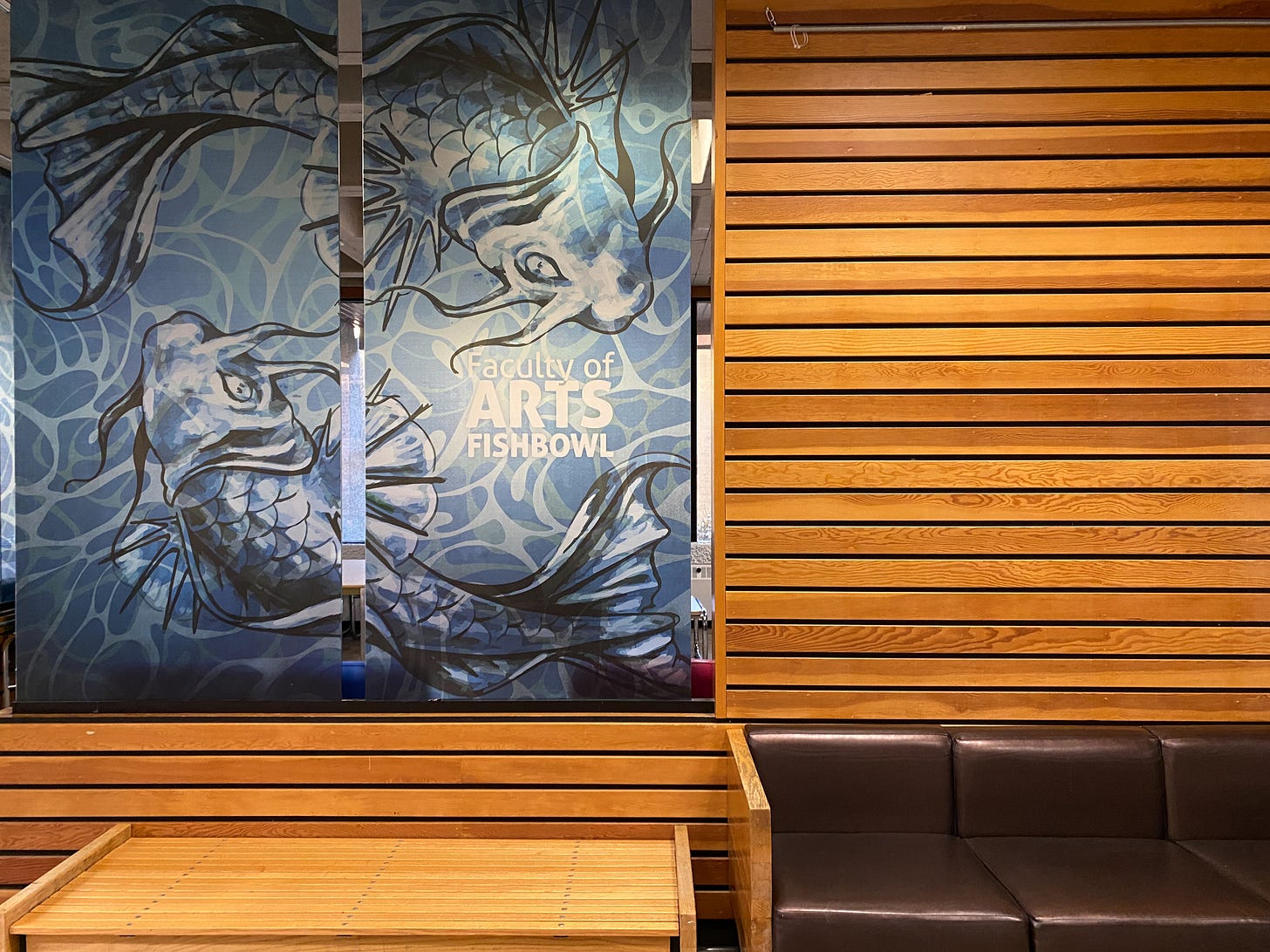In April, I decided that I wouldn’t go to my university convocation. It was something I hummed and hawed over for a while in a way that probably wasn’t necessary. But it felt like a big decision — I’d never be graduating from school again (unless I do a master’s, which I’m never doing) and this would be my last opportunity to walk across the stage. Friends of mine who’d graduated over the course of the pandemic lamented the fact they never got that opportunity. So with the first year back to normal graduations, I felt this urge to take advantage of something others didn’t get the privilege of and not squander the chance. A family friend even got in my head about how this is an important milestone that I should take part in for the sake of my dad being able to cherish the moment.
But the more I thought about it, the more I decided that I didn’t like the reality of my graduation ceremony. The idea’s nice and all, but I’ve dwelt too long in idealized fantasies. If I went, I wouldn’t have any friends to soak up the moment with, because any friends I had in university either graduated or will be graduating next year. So I’d be at the venue for hours with every arts undergrad, graduate, and PhD with a last name from A to L, none of whom I know. Plus it’d been a warm spring and the idea of cloaking myself in black is not a vibe. So why put myself through the ordeal because of others? My dad didn’t even want me to do it if I wasn’t into it and just because friends of mine loved the idea of convocating doesn’t mean I need to endure it.
The truth goes far deeper than this, though. I haven’t had any desire to attend grad because I didn’t actually like university. It felt like a neverending slog of attrition and I’m so grateful to be freed of it. It feels like the evil has been defeated. I don’t feel connected to academia and to be honest I’m not totally sure the experience was even real. School was just a thing I tried to get through after I found myself lacking the typical experiences students have that affixed themselves to the institution and made them feel part of something. It feels sickening that after all that degradation all I got was a piece of paper in the end.
It’s not like I didn’t try to have a fulfilling time at the UofA. I went to events for the human geography and planning club to try and meet people in my program and maybe make friends with people who had similar interests to me. I was really eager to do that because the vast majority of my friends at the time were people I had little in common with, which is probably why only a few from that time remain in my life. But the only friend I made at club events was an extremely clingy 18-year-old who may've been in love with me. Everyone else felt either superficially nice or pretentious, but maybe I just failed to make a proper connection to get past first impressions.
In all my years at university, I only made two lasting friendships. And the class I met them in is still a uni highlight. Our professor taking us on a walking tour of Strathcona only to wind up back at her house where she gave us homemade cookies was maybe part of why that class stands out, but mostly it’s because I actually had friends to share that experience with whom I was able to continue a connection with once the class ended.
I had so many failures to launch with university friendships that I eventually gave up. The most prominent was probably from my first semester English class when I briefly befriended two people because one of them was the only person who’d seen Mulholland Drive when I was forced to explain a piece of media I was going to write about for our first assignment. The other person thought I moved to sit next to her in the class after that revelation because I wanted to hit on her. The irony is that I think she wanted to hit on her but was already in a committed relationship. Surprisingly, I didn’t interact as much with Miss Mulholland as that protective friend. Her and I wound up talking for hours after class because we both had a block of spare time and were always heading in the same direction. We talked about so many things and I thought we were really connecting. But on the last day of class, I only got an “I’ll see you around.” And I know people don’t owe me a friendship, but that denouement just made me second guess all that time I’d spent with this person. Did she actually enjoy spending time with me or did she feel like she couldn’t get out of it? Was I doing something wrong? Other variations of this happened with less-developed class faux-friendships and after a few times it all began to feel pointless.
I don't think the age gap helped. I started at the UofA just shy of my 23rd birthday, around when most people my age were wrapping up their undergrad. While it meant I had a maturity that let me tackle post-secondary more easily than those fresh out of high school, it was still alienating. Everyone felt so young, something that only became worse as my years on campus wore on. It made me very self-conscious and it didn’t matter how many times I was re-assured by others that it didn’t matter. In my mind, it did. For my 7 years at university, I always felt old, even if nobody else cared or knew. I was (and am) out of sorts with how I’m supposed to be doing life, something I touched on recently as I reflected on my 20s.
I only truly enjoyed undergrad for maybe 3 months. Then it got bad and never recovered. I went to the UofA after a semester of general studies at MacEwan because a friend of mine who works on campus told me about the new urban planning program. He was surprised I never went into planning because of my obvious interest. I told him that when I looked into it in high school, there wasn’t anything in Edmonton and I didn’t want to leave, so I was flaneuring around to see what else might stick. I’d thought about photography, then at MacEwan, perhaps graphic design. I was about to apply to their design program that spring, after my general studies semester. But after my friend told me about the new program, I did a 180 and turned my focus to applying to the UofA for planning. I soon learnt that human geography, a near-parallel program to planning for the first couple of years (so much so that the acronym for both programs was HGP: human geography and planning), would be easier to enroll in. So I applied to that and hoped to switch to urban planning after my first year.
To absolutely nobody’s surprise, I got in and started my academic career in earnest for the Fall of 2016. When I entered my first lecture hall for a 200-level HGP course that September, I was that nervous excitement you get when you feel like you’re on the precipice of something amazing. I was excited about my future and elated that I could be doing something I love for the rest of my life. Well, that lasted a couple of months, up to the point of our major research paper, which was oddly enough the longest, most gruelling paper I ever had to write in uni. I poured my heart into it and thought I did a strikingly well-researched work, only to get a 67 on it. I tried speaking with my prof about it afterwards, to understand where I went wrong, because the TA who’d marked my paper seemed to have conflicting criticisms. Say less, but also say more. Do this, except here where I’m telling you to do the polar opposite. My prof, a notoriously hard marker as I would come to learn, sided with every criticism of the TA’s despite the rationale never being properly explained to me. So, instead of being inspired, that first class taught me about how arbitrary and unforgiving profs can be when grading things despite the logic not logic-ing. Yet, in hindsight, that first semester was probably my best in uni. I felt the most engaged, the most energized, and the most on top of things. I cared in a way that didn’t last long.
So what happened?
A lot. In a very short span, between November 2016 and February 2017. First, I poured myself into that major research project, which didn’t go over well. That was a major discouragement. Then my grandpa died. We weren’t that close, but it didn’t make things any less depressing. By the end of December, when my dad and I were finishing packing up and clearing out my grandpa’s apartment, I found myself with few people to talk to aside from that clingy kid I met at a club event a couple of months prior. Some of my major friendships at the time were going through rocky patches that left me not on speaking terms with them. That was partially my fault, I’ll admit, and even the friendships that did recover from that patch were never the same.
Then, in January, the most devastating thing happened. My dog passed away. She was and still is my favourite little lady and the day she died remains the worst day of my life. There was a point in November when she got sick that we thought this might be it, but then she miraculously recovered. But, the same thing came back in January. Her body was shutting down for some unknown reason. We’d done the tests, the x-rays — it all came back fine and so the vet didn’t know how to proceed. But she wasn’t keeping anything down; she shat until there was nothing left and then would shit blood. We felt helpless and knew she was in pain but couldn’t do anything for her.
We already knew the day she died would be her last. The suffering she was going through was blunt and we couldn’t help her. It’d been going on like this for days, and so on the Monday of the new week, it was decided that if she didn’t improve by Tuesday, we’d let her rest. When I woke up on Tuesday, she hadn’t improved, but my dad thought we could hold off till I was back from school in the afternoon, as I only had one class that Tuesday and I’d be back well before the vet closed. This would give her one last fighting chance, but I knew it was over regardless. So I stood at the top of the escalator at the University LRT station, looking out the window, waiting for my bus home, tearing up. That station is still haunted by that memory. When I got home and saw the mess she’d made because she’d lost bodily control, my dad messaged me for an update and I couldn’t bring myself to respond because responding felt like pulling the trigger. It was only when a friend, who I was panic-messaging, told me the hard truth: my dog needs me to be strong for her and that she doesn’t deserve to continue suffering like this. So, I eventually told my dad the bad news. Nothing can prepare you for being the last thing a living being sees as they slowly die before your eyes. Nothing can prepare you for feeling the warmth of a body slowly go cold. I cried for weeks after. I’ve never cried so much in my life. I still miss her and feel guilty for allowing myself to move on. It breaks my heart every time I think about the fact that I don’t get to spend the rest of my life with her in it.
Needless to say, school wasn’t much of a focus anymore. While everything before my dog’s passing took a toll, none of them derailed me quite like she did. Classes did accommodate me a bit, but I also didn’t care anymore. The enthusiasm I had a semester prior was gone. I stopped being on top of my readings and began napping in Telus between classes. In an English class (different from the one in which I attempted to make friends in the previous semester) I found myself completely skipping certain literature. I couldn’t give a fuck about Margaret Atwood’s poetry. I didn’t have the energy to read the main novel for the course, In the Skin of a Lion, either. But I found out something important in that lack of care: you don’t actually need to stay on top of everything to do well in a class. The class’ assignments pulled from our literature, but you had options. So I wrote about the ones I actually read. The final was similar: you had to write an essay about a piece of literature from the class based on a certain prompt, but the options always left me with one that I actually read, and I didn’t have to worry about the ones I didn’t.
This awareness that I could slack off and still do well let me see right through the academic structures I previously took as truth. It also made the whole thing feel like a joke. School became more of a game of figuring out how little I could do and still get a good grade. I discovered I could put in significantly less effort and get as good or slightly lesser grades as when I was giving my all. I questioned why I put so much effort into that assignment I bombed in that first semester HGP class. It felt like I knew this secret about university that nobody else did. I would keep all of this in mind even as the years went on and I moved on from the loss of my first year in uni. All around me were 19-year-olds bending over backwards, stressing out to stay on top of it all, and here I was just seeing how far I could go before I blew the popsicle stand. I learnt that not only did I not really need to do every reading, but most of the time I also didn’t need to attend every lecture. Through this period, I got all As and Bs, so at the end of the day I was getting results. And with each semester, I let myself slip a little bit further from staying on top of things and would get a bit anxious that maybe this time I’d gone too far, but I never crossed that line.
That’s not to say I didn’t occasionally enjoy a class and try to be more on top of things or put in a modicum of effort. Those lectures happened, but very sporadically. My Science & Technology in Society class, that 300-level HGP where I met my two uni friends, the one Cultural Studies course I took, and that Social Justice in the City lecture right before covid hit are a few of the highlights.
But, of course, covid did hit. And then everything went to hell. Whatever stamina I still had for school vanished overnight. As time stretched and tore, it all fell into a vortex. By Fall 2020, when school had fully shifted online, I found it hard to adjust to the new reality. Back in 9th grade, when I was choosing which high school to go to, I had the option of going to St Joe’s, where everything’s self-directed, without physical classes to go to. But I knew then as I do now that I needed structure to stay tethered to the reality of school. Online, from-a-distance school was just like I imagined that high school, and naturally, I wasn’t very good at it. I couldn’t manage to be engaged and it was too easy to completely flake out on lectures, readings, or assignments. I really need a physical location to be at where I can interact in real life with people in order to stay engaged with work. Unless I’m really passionate about something, which as you know, was not the case for my degree.
By the time things started going back to in-person for fall 2021, my eyes were permanently glazed over for school. Nothing could change it. Classes, where I found the topic interesting, felt like just as much of a chore as the duller ones. I was tired of the formulaic nature of it all. It just felt like the same series of inputs ad nauseam. Lecture, reading, assignment, exam. Over and over and over and over again. I’d started feeling this long before covid, but the pandemic exacerbated it greatly. I found that I didn’t enjoy the structure of school — being dictated what and how to learn. This may’ve had something to do with being someone in his late 20s, with fully formed ideas of what guides and interests him, contrasting the lecture halls of folks in their late teens, still figuring all of that out. Because I do still enjoy learning, but on my own terms, without deadlines or other requirements. Having knowledge itself dictated in particular ways would only make me tune out further.
In the covid era, I’d stop reading course material altogether. If I needed to know anything for an assignment, I’d just Ctrl+F the keyword to find the relevant snippet. If I needed to write an essay, I’d never proofread. I wasn’t getting anything out of it — I was inputting the bare minimum just to get it over with. I can’t remember the last time I actually bought a textbook, either. Quizzes shifted online and it was easy to just look up a question’s answer in relevant materials without ever ingesting knowledge. I was a bad student and had been, in slowly increasing degrees, since my dog passed. The covid era at the end was just the culmination of it all. But I didn’t care because the credits kept rolling in and I got closer to being done once and for all.
The covid era was also when I went from feeling old to ancient on campus. Around my second year at the UofA, I began noticing how everyone looked 12. They were all so young. But I still identified with being a young adult, so it was a bit weird, but not like I was in a totally different place from them. We were, after all, going to the same classes, frequenting the same spaces, and so forth. But when I wound up back on campus in ‘21, I no longer identified with being a young adult. I felt so beyond what my classmates were doing, like I’d already been there, done that, enough times, to see right through the naivete and earnestness. Like, babes it’s just a course, you don’t need to invest so much into it. You’re getting the same little credit at the end just like me, who is comfortably not giving a fuck. Maybe I’m too cynical.
It doesn’t help matters that I feel lacking in most of the classic uni experiences. I was never part of anything. I was never in with the go-getters in the planning program. I had no extracurriculars. I tried with the geography-planning club and it went nowhere. I didn’t have a community — a common theme in my dissatisfaction I’m realizing. Isn’t university supposed to be where you find yourself? I know I sure didn’t. It wasn’t a groundbreaking, pivotal experience like it’s meant to be — it was something that wore on me, slowly, over time, till all the fucks were gone.
I never even had a proper seminar class. A friend and I talked about this recently, one who was in planning and did know a lot of the characters from more than a distance. She said that because planning at the upper levels is much more streamlined into the same courses with the same tight-knit group, often in seminars, it was hard to not get to know people on some level. Human geography, comparatively, wasn’t like this and so I missed out on that connection.
You might be wondering, “but aren’t planning and human geog basically parallel programs?” Well yeah, for the first couple of years students in both programs overlap each other and take the same, more general courses. But that changes in the upper levels, which is why my intent was to switch from human geography to planning after my first year. So why didn’t I do that?
Two reasons. I fell out of love with urban planning. And stats. But the latter was the catalyst. To get a little technical, I graduated high school in 2011. In Alberta, there were a few streams for core subjects (Math, English, Social Studies, and the Sciences) — honours, regular, and lower. For math, I was in the lower stream. I was never particularly good at math and thought I just would have a career in something that didn’t require much of it. Unfortunately, planning at the UofA has a math requirement from high school (this isn’t the case at other schools, like York or TMU).
The good news, I thought when reading the application to transfer, was that the planning requirement accepted both the regular and lower streams of high school math for credentials. The year after I’d graduated, in 2012, the Alberta high school math curriculum got a massive overhaul. There’d still be 3 streams, but they’d be updated and cleaned up. The language of requirements for the planning program reflected this with the new names for the math streams. I figured since I had the equivalent of one of these courses when I was in high school, I’d be fine.
That belief turned out to be incorrect. My application to planning was rejected because of high school math. The university’s justification was that I wouldn’t be grandfathered in based on the prior version of an accepted course because at the time that course wasn’t accepted. Except that the planning program wasn’t around then. The real reason for the math requirement was not the planning program in general, but one of the program’s course requirements: a 100-level Stats course.
Still, that wasn’t the end. I wanted to be a planner, despite this setback. I decided to upgrade my high school math. If that wasn’t debasing enough, I was recommended “for best success” to not only take the 12th grade math, but 11th grade, as the latter builds into the former and helps it make sense. I completed the 11th grade math but really dreaded doing it all over for 12th. So I spoke to a planning prof on campus and he said that, although he can’t officially advise this, technically if you just enroll in the Stats class, they don’t generally make sure students have the prereqs beforehand, and so if you can complete it and get the credit, you’d be able to get into planning. He said he’s seen at least one other student do this.
So I tried that.
It didn’t go over very well. Remember, I’m not a maths person. I felt so out of my depths in that Stats class. The lecturer sucked, which of course helped no one. But still, students would have relevant questions or answers to the prof’s queries and so clearly others were able to follow along to some degree. How I felt in that class was probably similar to how engineering students felt in humanities lectures. Naturally, I bombed the midterm. I couldn’t keep up, even with more mathematically-inclined friends trying to help tutor me through it. Maybe I should’ve done that 12th grade math upgrade after all. At any rate, I decided that the way the course was going post-midterm that I likely wouldn’t pass, and so instead of having that on my record, I withdrew.
I wasn’t happy about it, but by then, I was already falling out of love with urban planning as a discipline. I still loved cities, but this wasn’t it for me like I thought it would be. I figured that the likelihood of me being able to really do anything of note in terms of improving cities and implementing my ideas was nearly zero. And I don’t mean that in the sense that I thought previously that I would be able to design cities right out of school, in my first career job. I knew and was fine with doing grunt work while building experience. It’s more that I realized that urban planning is very collaborative, which isn’t necessarily terrible, but it does mean you have a lot of voices in the room and that tends to not allow for much vision as compromise becomes the way. You might be able to have some say in one segment of a larger piece, but that piece will have other segments influenced by others who may clash with your vision for a place. Plus dealing with NIMBYs who never want anything to change and how much of the job is just dry paperwork of little consequence. I also realized that the structuring of planning as a profession within North America leads to it fundamentally hyperbolizing systemic injustices. I spoke on this previously, so I’ll just quote myself here for ease:
Urban planning, as it exists on this continent today, boils down to helping municipalities accumulate more revenue via property tax because they’re so underfunded by other levels of government. In practice, this means planners aim for gentrification, exaggerating an already stratified society.
Human geography may deal with similar topics as planning but from a different point of view. It isn't embedded directly in the design of settlements, and is therefore able to take a look from a distance and be more critical. Which I liked. And still do. As a discipline, human geography is a better arena for me.
The problem is the career prospects. It’s a much clearer path for planning grads than me. There aren’t many jobs that deal purely with human geography outside of academia. The beauty is that it, like any BA, can be applied in a myriad of ways. However, the problem is that having seemingly boundless options makes it hard to know exactly where to land. It’s the curse of too much choice. So I have no idea where to go from here now that I’ve graduated.
One of the things that bothers me most about university is how long it took for me to get through. I was in school from 23 to 29, the bulk of my 20s, and loathed most of it. That’s a long time doing something you hate. But it felt so necessary because what prospects are there for a high school diploma these days? I could’ve done it sooner — after all, it was a “4-year degree” but I honestly don’t know how people have the capacity for 5 full courses every semester while maintaining sanity. I also wanted flexibility to pursue photography, which from 2016 to 2019, mostly revolved around an ill-fated “Canada” documentary project (discussed a bit here). I wanted to be able to work with having certain days off to have more time and ability to visit various locales. But truthfully, I mostly wanted a work-life balance with university. I still valued my leisure. There were also a couple periods where my course load was severely reduced for mental health reasons. The first was Winter 2019, due to a bad breakup that I’ve already brought up here too many times. The second was the covid malaise in Winter 2021 making me sloppy with course choices such that I accidentally only wound up in 2 classes. It all adds up.
The loss of my childhood dog early in my academic career fundamentally shifted my relationship to school. Maybe that sounds weird, but I loved her and she was incredibly important to me. People forget that even when you’ve moved on, so to speak, the trauma of loss never fully leaves. The darkness it caused left long-lasting repercussions on how I felt about school. Losing her made me dissociate from the experience, further compounded by a lack of community to tether me to university. It set me on a path of disconnect that reverberated into the covid era when all remaining fucks were dropped. The irony is that despite how divorced I feel from post-secondary itself, up to and including lacking any desire to attend my convocation, I really needed that piece of paper at the end. My physical degree reminds me that this wasn’t all some fever dream (er, nightmare). It wasn’t fake, but very real. I may not have liked it, but I persevered and eventually made it. I don’t know the real value of it, yet I’m glad that there’s at least something to show for it, however flimsy and flammable. It’s quite comical that despite my bemoaning how all these years boiled down to a piece of paper in the end, I still want it, on some level. Maybe it’s to delude myself into thinking it mattered or to prove that I’m capable of normal ideas of success. Or perhaps it’s just a token of my attrition. At any rate, I’m glad to have it, even if I’m not happy about why it exists.













